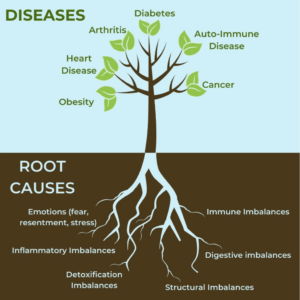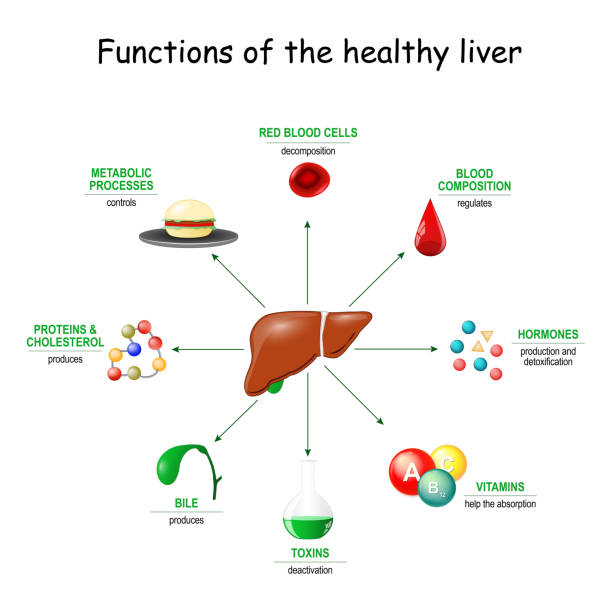The Hidden Causes: A Functional Medicine Approach To Restoring Balance And Vitality
“Everything looks fine! You have nothing to worry about – you’re in perfectly good health.”
Ever heard that before after scheduling a visit to the doctor because something felt off? Maybe it was hormonal and you felt moody, bloated, and gassy, your cycle was irregular, and your mood was low. Or, maybe it was your digestion – you weren’t going to the bathroom every day. Your gut felt heavy, full, weighed down, cramped up.
As disheartening as it can feel to get that “everything’s fine, be on your way now” dismissal, going to the doctor is usually an intelligent first step. When you have that gut feeling that something just doesn’t feel right, it’s important to rule out any serious causes that require more immediate medical screening and intervention, such as inflammatory bowel disease, an autoimmune condition like rheumatoid arthritis, some form of cancer, etc.
You did your due diligence by seeing a medical doctor, and they (hopefully) did theirs by running labs and checking for criteria that matches up to a diagnosis and corresponding medication. In the conventional medical setting, that’s about what we can expect to get. Imagine you found out something was really wrong, good for you for getting checked out so you can quickly take next steps!
When all you find out is there is nothing dire going on, though, what’s next?
You still don’t feel well. And you’re left even more confused than before because there’s no simple explanation like you might’ve been expecting or hoping for. In fact, you might have even been made to feel invalidated, told that your concerns are in your head and it’s just a manifestation of stress. To be frank, this is the point where things fall into your own hands and we need to do some digging! You can choose to do this on your own, or search for an experienced holistic practitioner who will help you. And let me drop a hint here… as someone who’s spent countless painstaking years trying to figure out mysterious health problems of my own, sorting through confusing and conflicting information and experimenting with different diets, supplements, and protocols as if I were a lab rat (before finding my way to functional medicine), I would recommend the latter!
Conventional medicine typically stops at the diagnosis and the drug that corresponds with it. Beyond that, there’s not a whole lot of training around lifestyle interventions like coaching on nutrition, physical activity, sleep, and stress management. Meanwhile, these are the factors that underlie the fate of our health!
 So, this is where functional medicine comes in. The goal of a functional medicine approach is to investigate root causes and connect the dots from one imbalance to another, versus treating each system of the body as its own separate entity. Your hormones are all out of whack? Let’s see what’s going on with your thyroid. Keep getting recurrent UTIs popping up? Let’s look into the gut.
So, this is where functional medicine comes in. The goal of a functional medicine approach is to investigate root causes and connect the dots from one imbalance to another, versus treating each system of the body as its own separate entity. Your hormones are all out of whack? Let’s see what’s going on with your thyroid. Keep getting recurrent UTIs popping up? Let’s look into the gut.
These are all examples of the many connections we can explore and address through lifestyle to restore equilibrium in the body and optimize the ways in which everything works together like the different instruments in a symphony. Imagine you’re at the orchestra, and a violinist is totally off tune, producing a horrible, squeaky cacophony. You can just barely hear the violinist, in particular, from your seat in the audience, but mostly the entire song just sounds a bit messy. How do you think this out-of-sorts violinist will affect the instrumentalist next to them? And if that one is getting thrown off, what about the one next to them? This ripple effect is a good analogy to when one body part or organ system isn’t functioning optimally, and down the line it leads to suboptimal functioning and agitating symptoms – low energy, brain fog, headaches, digestion issues, anxiety, depression, recurring UTIs and other infections, high cholesterol, etc.
To explore how all the different systems of our body affect others down the line, let’s take a deeper dive into the root cause and resulting effects of high cholesterol.
Say you’re doing everything your doctor has recommended to help lower your LDL (AKA “bad cholesterol”) – limiting your saturated fat intake, avoiding sugar and processed carbohydrates, exercising regularly. However, no matter what you do, you can’t get that dang number down like you used to be able to in the past and could just dial things back a bit. Now, you’re buckling down on these changes more than ever, and that level just won’t budge.
Sure, genetics can absolutely be a big player in hypercholesterolemia. But there’s more we can explore before writing it off to bad genes, getting started on a statin, and calling it a day. For example, when I hear of a case like this, one of the first things I want to look into further is liver function. The way that cholesterol is regulated in the body is it’s brought into the liver to get converted into bile. Bile then moves into the gallbladder where it becomes more concentrated and is stored until it’s released into the duodenum with pancreatic enzymes. This process aids in breaking down our food, allowing our body to ultimately absorb the nutrients we consume into our cells to be converted into energy.
When the liver isn’t functioning optimally, you can see a kink in the chain leading to impaired clearance of cholesterol, high LDL, and nutrient malabsorption. Ultimately, this impairment can manifest into a multitude of symptoms. When your body cannot efficiently break down and utilize essential nutrients, we can expect, over time, fatigue, poor concentration, mood imbalance, and truly almost any other symptom you could think of.
However, this is just one of the many other pathways that can be affected down the line from that suboptimal liver function. For example, bile, made by the liver, has a direct antimicrobial effect in the digestive tract, helping to balance out the ecosystem that consists of trillions of yeast and bacterial cells which play a massive role in virtually every aspect of our health. Over time, this lack of antimicrobial activity can lead to dysbiosis, or imbalance in the gut microbiome, since there’s less protection from pathogens and overgrowth. Dysbiosis comes with a whole host of digestive symptoms, including abdominal pain and cramping, gas, bloating, and unhealthy, irregular bowel movements.
By this point, you’re probably not surprised that it doesn’t end there.
One of the liver’s primary functions is to metabolize hormones, such as estrogen, insulin, thyroid hormones, and cortisol. Hormones are chemical messengers that regulate various bodily processes, including growth, metabolism, reproduction, and stress response. When these hormones have completed their tasks, they need to be broken down and eliminated from the body. Estrogen, for example, is metabolized by the liver into different forms that can be easily eliminated. If the liver is not functioning optimally, it may have difficulty breaking it down efficiently. As a result, estrogen levels can build up in the body, leading to an imbalance known as estrogen dominance. This hormonal imbalance can cause a range of symptoms, including mood swings, irregular menstrual cycles, weight gain, and even increase the risk of certain cancers, such as breast and uterine cancer.
When faced with vague or dismissed symptoms that leave us feeling frustrated and confused, it is essential to take control of our own health journey. While conventional medicine may provide valuable insights into serious conditions and offer medications to manage them, it often falls short in addressing the underlying imbalances and providing comprehensive lifestyle interventions.
This is where functional medicine steps in, focusing on identifying root causes and exploring the interconnectedness of various body systems. By examining the relationships between different imbalances and addressing them holistically, functional medicine aims to restore equilibrium and optimize overall health.
Functional medicine recognizes that the body functions as a symphony, with each system and organ playing a crucial role. When one component is out of tune, it can disrupt the harmony of the entire orchestra. Similarly, when one aspect of our health behaviors is imbalanced, such as stress management, it can lead to a cascade of symptoms and affect other systems.
Taking high cholesterol as an example, functional medicine looks beyond genetics and explores liver function as a potential factor. The liver plays a vital role in cholesterol regulation and bile production, which is essential for nutrient absorption and microbial balance in the gut. Impaired liver function can result in elevated LDL cholesterol, impaired nutrient absorption, dysbiosis, and a range of symptoms affecting energy, concentration, and mood.
The interconnectedness of the body becomes evident as imbalances in one area lead to disruptions in other systems.
This understanding highlights the importance of a comprehensive approach to health that includes lifestyle modifications, such as nutrition, exercise, sleep, and stress management.
By embracing functional medicine principles, individuals can take charge of their health and work towards restoring balance and vitality. Seeking the guidance of experienced holistic practitioners who specialize in functional medicine can provide valuable support in navigating the complex web of interconnected imbalances and developing personalized strategies for optimal well-being.
In conclusion, when conventional medicine falls short in providing answers to vague or dismissed symptoms, we at Rachel Scheer Nutrition, offer a holistic approach to uncovering root causes and restoring balance. We empower individuals to take an active role in their health and serve as their guide as they embark on a journey towards comprehensive well-being.
To book your FREE 30-minute consult today click here!

Rachel Scheer is a Certified Nutritionist who received her degree from Baylor University in Nutrition Science and Dietetics. Rachel has her own private nutrition and counseling practice located in McKinney, Texas. Rachel has helped clients with a wide range of nutritional needs enhance their athletic performance, improve their physical and mental health, and make positive lifelong eating and exercise behavior changes.
Read This Next
Micronutrients, or the vitamins and minerals your body needs, typically work like a team. To…
If you want to improve gut health, or even optimize your overall health, you’ve probably…
Have you ever found yourself grappling with the discomfort of abdominal distension, bloating, or cramping,…







